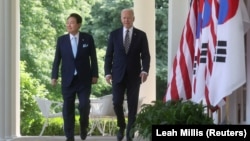At its core, the U.S.-Republic of Korea alliance is about building a better future for all of our people, said President Joe Biden in a joint press conference with South Korean President Yoon Suk Yeol.
“There’s no better example than our economic relationship and partnership, which is delivering incredible benefits to both our nations,” said President Biden:
“Through the Indo-Pacific Economic Framework, we’re advancing economic growth grounded in high standards for our workers, for the environment, and for communities throughout the region. We’re standing together against economic influence being leveraged in coercive ways. And since I took office, Korean companies have invested more than $100 billion in the United States, driving innovation and spurring good new jobs for Americans and Korean workers.”
Our mutual defense treaty is ironclad, and that includes our commitment to nuclear deterrence, said President Biden:
“They are particularly important in the face of the DPRK’s increased threats and the blatant violation of ... sanctions. At the same time, we continue to seek serious and substantial diplomatic breakthroughs with the DPRK to bolster stability on the Peninsula, reduce the threat of proliferation, and address our humanitarian and human rights concerns for the people of the DPRK.”
The Republic of Korea and the United States are working together, including through their trilateral cooperation with Japan, to ensure the future of the Indo-Pacific is free, open, prosperous, and secure. Both leaders also discussed their commitment to peace and stability in the Taiwan Straits, ensuring freedom of navigation in the South China Sea and beyond.
President Biden thanked the Republic of Korea for its strong support for Ukraine.
“The choices we make today,” said President Biden, “are going to determine the direction of our world and the future of our kids for decades to come.”
“From tracking the climate crisis and strengthening our effort to fight it, and strengthening global health,” declared President Biden, “no two countries are better suited to meet the challenges ahead than the Republic of Korea and the United States.”














